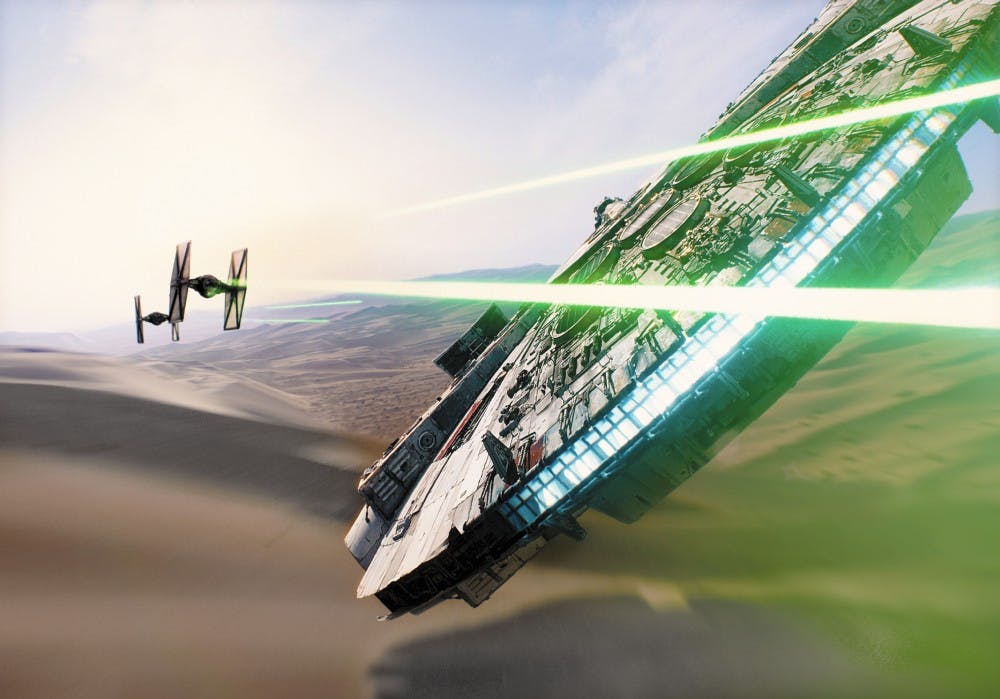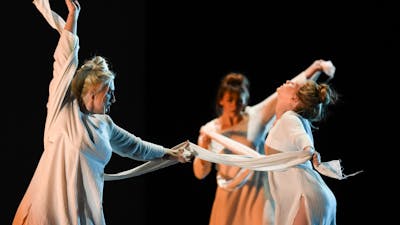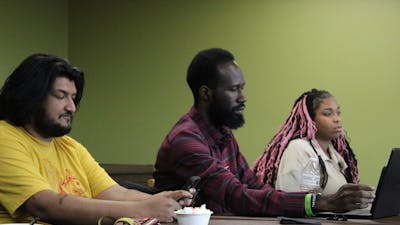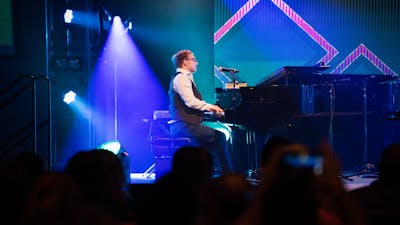A conversation with Dr. Ken Jurkiewicz on the rebirth and legacy of Star Wars
A long time ago, in a living room far, far away, a young George Lucas sat in front of a black and white television. Transfixed on the swashbuckling space adventures of "Flash Gordon," Lucas absorbed tropes of pulp Hollywood serials that were prominent during his childhood.
Somewhere across the country, Central Michigan University professor Ken Jurkiewicz watched the same shows, read the same comic books, and pined for the same cinematic nostalgia. This was the world that helped foster minds like Lucas to dream up the epic saga known as “Star Wars.”
What was it about those early syndicated broadcasts that moved Lucas to become a director himself? Or rather, what was it about the late 1960s that pushed Lucas and contemporaries like Steven Spielberg to dream bigger than ever before?
For those answers and more, one can look to Jurkiewicz, a man who wields movie knowledge — and possibly the Force — like the most esteemed members of the Jedi High Council.

It’s easy for fans to pick out what they like about the “Star Wars” films. What resonates with both hard core nerds and the general audience?
JURKIEWICZ: (Star Wars) is an amalgamation of American popular culture put into a blender, in the same way that Quentin Tarantino does in his movies. It also has to do with the fact that these movies, including Indiana Jones, are better-produced homages to serials from the 1930s and 1940s, like Flash Gordon. And they’re structured that way. A lot of these movie brats, these hippies that went to film school, they all eventually took over Hollywood.
Brat pack sounds sounds like a rat pack of filmmakers.
They were: Lucas, Steven Spielberg, Martin Scorsese, Francis Ford Coppola and Brian DePalma. These guys were the first generation to grow up on television, rock n’ roll music, and pop schlock like Flash Gordon.
These guys absorbed all of that as it was recycled through television and magazines. “Star Wars” is all post-Watergate, post-Vietnam, and somewhere along the line, there existed a nostalgia for a more innocent time. Before he concocted the story line that became “Star Wars,” George Lucas wanted to do “Flash Gordon.” He couldn’t do it because another producer got a hold of it.
Why is it that few remember Flash Gordon, but “Star Wars” characters are iconic?
It also goes along with the idea of mythic archetypes. Stories about heroes who were pure, with the lines between good and evil clearly defined in basic, stark terms.
The idea of shared myths has to be taken with the theories of someone like Joseph Campbell and his work, “The Hero With A Thousand Faces.” Campbell was very fashionable in the 70s. He devoted his entire career to studying how various familiar characters are shared across the board in history. Every major culture has a story about a God Figure. Every story has a Demon Foe, or maybe a Cinderella character.
I doubt many have thought academically about a blockbuster film. How can you see this in the films?
Take Darth Vader, for example. When I saw the movie and saw this dude show up, and his name is Darth Vader, the root of that term is “Dark Father.” Well then, I knew that was (Luke Skywalker’s) father.
I thought, “are they going to point that out in the first movie, or develop it later?” And they did.
Is “Star Wars” fantasy or science fiction?
Lucas insisted in several places that he considers “Star Wars” fantasy, pure fantasy. Just because it’s in space doesn’t make it sci-fi in any way, shape or form.
Science fiction is about extrapolating what we know about the universe; developing narratives that sort of amplify, or makes us question, certain things about ourselves. That’s not really what’s going on in “Star Wars.”
The other influence on Lucas was a Isaac Asimov who wrote the Foundation series, which was a series of novels and short stories of a type of Roman Empire in outer space. His was a much more sophisticated on what was referred to as the space opera, which is basically a western set in space.
Look at “Star Trek” – space, the final frontier. It’s a wagon train movie set in space. It’s exactly the same value system. You’ve got the gunslingers and the wagon masters.
Han Solo is that lone gunslinger, the mercenary for hire, the cynical guy. Sort of shady, you know. He’s the classic western hero. The outsider and the outlaw who ends up siding with the good guys, but can never be a part of the establishment. He is the outlaw. In many westerns, the hero is that outsider.
Were those films the first to be big summer blockbusters?
The real game-changer was “Jaws.” That was the first big summer blockbuster movie. That sort of demonstrated to Hollywood that there was this young audience that wanted to be catered to. It was also sort of a bridge to a slightly older audience that grew up watching serial stuff. “Jaws” was basically a 50s monster movie
Then came “Star Wars.” After that we were off to the races. The template was set, and it was all because of these brats. Starting with “Jaws”, from about the mid 70s to the mid 90s, its been estimated that three out of four movie tickets, 75 percent of all tickets were sold to people between the ages of 12-24.
Now it hasn’t changed that much, if you look over the last 20 years, it’s still been catering to the 12-24 audience.
There’s all the comic movies, but the template was set by “Star Wars.” Then came the idea of doing sequels and franchising.
How often did studios attempt to tell stories with an episodic format before “Star Wars?”
There have always been series of films, like the James Bond movies which started in the early 60s, but there wasn’t the same kind of continuation of characters and a story arc that extends over several movies.
Usually when you talk about series, you talk about very formulaic movies, like the Frankenstein movies. This was different because of the overarching story arc.
People often complain that “Empire Strikes Back” — the middle part — is sort of unsatisfying because it ends on a cliffhanger. That just simply builds more anticipation. I think that the idea of a trilogy that extends in a single story, that became even more popular now, but not just because of “Star Wars,” but the adaptation of adult fiction. Everyone’s trying now to recapture that Harry Potter magic, and except for “The Hunger Games,” I can’t think of any other popular new series of young adult fiction (that have done well). There are others, but they are imitations.
With an emphasis in milking properties for all they are worth, will we see that with “Star Wars?”
Disney wants to do a “Star Wars” movie every year now. There is such a thing as too much of a good thing. At a certain point you begin to spin your wheels. In the case of “The Hunger Games,” you have four movies, splitting one movie into two. We saw that with Peter Jackson’s “The Hobbit.” One book extended over four movies.
What was your reaction to the original “Star Wars” trilogy?
I saw it when it came out and I was as impressed with it as everyone else was because it was a return to a simpler time.
It really tapped into this aching sense of nostalgia we were all feeling. This was post-Watergate, post-Vietnam; the American and global audience was in the mood for something that was escapist – just a simple space opera for entertainment. It was a “Flash Gordon” serial. People had the same reaction to “Raiders of the Lost Ark.” These were sort of tributes.
“Star Wars” still seems like the mother of all unlikely hits.
It was considered a big risk, and in fact, Lucas didn’t really have much faith in it. There’s a story that Lucas made a bet with Spielberg.
Spielberg said, “George, I’ll take the bet because you’re going to lose.” He had no idea that it
would take off the way it did.








